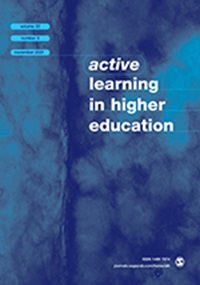实践共同体还是交往理性?自主同伴辅助学习的研究
IF 3.8
1区 教育学
Q1 EDUCATION & EDUCATIONAL RESEARCH
引用次数: 4
摘要
同伴辅助学习被定义为“学生和重要他人之间的学习关系网络”,在高等教育中表现出一系列令人困惑的形式。将这些概念化的一个有用方法是借鉴实践共同体和交际理性的思想,学生自主程度是第三个关键因素。我们通过对Kuppi的研究来说明这种方法,Kuppi是一个完全由学生发起和组织的同伴辅助学习的例子。我们采访了来自斯里兰卡六所州立大学的本科生参与者,发现学生学习者和学生导师对这种同伴辅助学习模式给予了大力支持。这些课程的特点是非正式和讨论、时间和地点的灵活性以及对评估的关注。学生决定教学内容和教学对象,而导师出于兄弟情谊,无偿提供时间,以提高自己的学习和技能。交际理性理论在很大程度上解释了这种形式的同伴辅助学习的吸引力。有证据表明有一个强大的实践共同体;然而,除了渴望成为学者的同行导师之外,这主要涉及强化学生身份,而不是转变为新兴角色。Kuppi所表现出的高度参与和学生自主性挑战了同伴辅助学习必须由导师组织才能有效的建议。本文章由计算机程序翻译,如有差异,请以英文原文为准。
Communities of practice or communicative rationality? A study of autonomous peer assisted learning
Defined as ‘networks of learning relationships among students and significant others’, peer assisted learning takes a bewildering array of forms in higher education. A useful way to conceptualise these is to draw from ideas of communities of practice and communicative rationality, with the degree of student autonomy a third key element. We illustrate this approach with a study of Kuppi, an example of peer assisted learning initiated and organised entirely by students. We interviewed undergraduate participants from six state universities in Sri Lanka and found strong support for this model of peer assisted learning from student learners and student tutors. These classes are characterised by informality and discussion, flexibility in timing and location and a focus on assessments. Students determine the content and who teaches, whilst tutors give their time without payment, out of fraternity and to improve their own learning and skills. The theory of communicative rationality helped explain much of the attraction of this form of peer assisted learning. There was evidence for a strong community of practice; however apart from peer tutors aspiring to become academics, this involved mostly reinforcement of student identity rather than transformation into emerging roles. The high levels of engagement and student autonomy shown by Kuppi challenge suggestions that peer assisted learning must be organised by tutors if it is to be effective.
求助全文
通过发布文献求助,成功后即可免费获取论文全文。
去求助
来源期刊

Active Learning in Higher Education
EDUCATION & EDUCATIONAL RESEARCH-
CiteScore
13.20
自引率
12.00%
发文量
31
期刊介绍:
Active Learning in Higher Education is an international, refereed publication for all those who teach and support learning in higher education (HE) and those who undertake or use research into effective learning, teaching and assessment in universities and colleges. The journal is devoted to publishing accounts of research covering all aspects of learning and teaching concerning adults in higher education. Non-discipline specific and non-context/country specific in nature, it comprises accounts of research across all areas of the curriculum; accounts which are relevant to faculty and others involved in learning and teaching in all disciplines, in all countries.
 求助内容:
求助内容: 应助结果提醒方式:
应助结果提醒方式:


